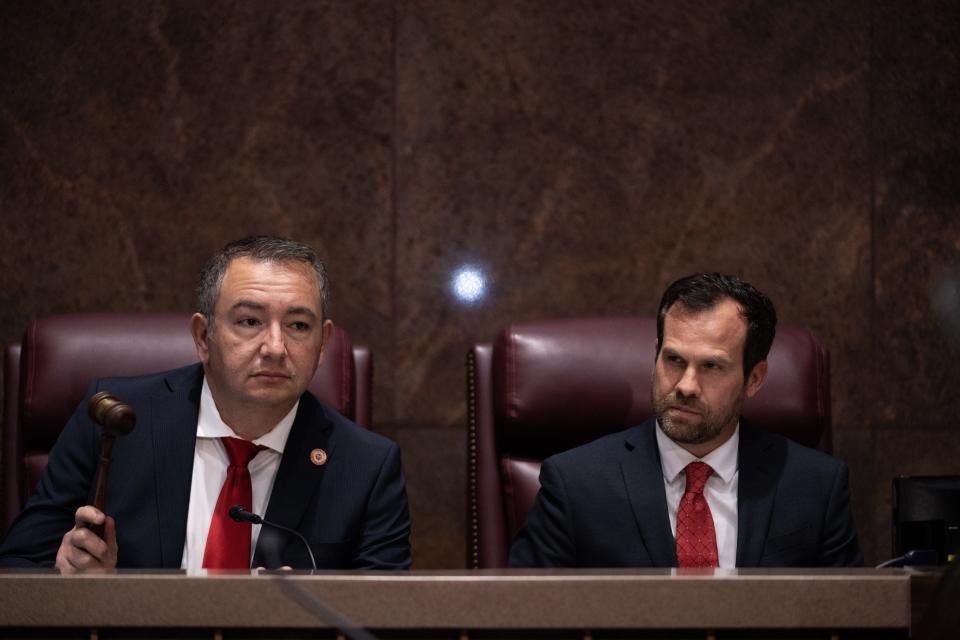Arizona GOP leaders sued to stop 'dark money' transparency. A judge will rule by year's end
A judge Wednesday said he will rule by Dec. 29 in a case challenging the constitutionality of a voter-approved law on campaign finance transparency.
Attorneys representing Republican legislative leaders are asking Maricopa County Superior Court Judge Timothy Ryan to issue a preliminary injunction to block the law. It requires disclosure of major donors to campaigns that until now have been able to mask their contributors by creating a class of nonprofit organizations that don’t have to name their donors.
At the same, time attorneys defending Proposition 211, the so-called anti-dark money law, want Ryan to dismiss the challenge.
Ryan reiterated his intent to issue a decision before the end of the year at the end of a nearly two-hour hearing.
“I’m going to give this case a priority, given what’s happening in 2024,” Ryan said.
It’s a recognition of the contentious nature of elections, and the high-dollar spending the three statewide elections next year will incur. Among those is the November general election, where the U.S. presidency, every legislative seat and several ballot propositions will be decided.
Senate President Warren Petersen, R-Gilbert, and House Speaker Ben Toma, R-Glendale, filed their challenge in August, after a judge had rejected a different challenge filed by the Center for Arizona Policy and the Free Enterprise Club.

The lawmakers' suit is one of three targeting Proposition 211, which voters approved in November 2022 with 72% of the vote. The CAP/Free Enterprise complaint was refiled with new arguments in county court. The third suit, filed by Americans for Prosperity and its foundation, awaits action in U.S. District Court.
The GOP leaders take a different tack than the other two suits, which hinge on claims that the law violates donors’ First Amendment speech rights. Instead, the lawmakers argue the law is unconstitutional because it violates the separation of powers, among other things. By giving the Citizens Clean Elections Commission the power to write rules on how the new law will play out, Proposition 211 robs the Legislature of its lawmaking duty, they argue.
“It takes away the power from the Legislature, it takes away the power from the people,” the lawmakers’ attorney, Brett Johnson, told Ryan.
Johnson also cited the “irreparable harm” that would happen to legislative powers if Proposition 211 is allowed to stand.
The defense countered that if the lawmakers felt there truly was permanent harm from the law, they would not have waited 279 days after its passage to seek an injunction.
“Mr. Toma and Mr. Petersen simply wanted to throw something at the wall and see if it would stick,” argued James D. Smith, attorney for the Clean Elections Commission.
He told Ryan the lawmakers’ complaints are not based on any actual harm, but are grounded in fears of what might happen as the law rolls out. The court cannot act on hypothetical suppositions, he said.
In a court filing, Smith wrote the lawmakers do not cite any court cases that would buttress their argument that Proposition 211 violates the separation of powers doctrine. He then ticked off a list of cases where executive branch agencies have been given authority to carry out certain rules and regulations, with no violation of the powers doctrine. Clean Elections is an executive branch agency.
Smith was joined by attorneys from the Washington D.C.-based Campaign Legal Center, who are representing Proposition 211’s sponsor, the Voters Right to Know committee. Attorneys for Secretary of State Adrian Fontes and Attorney General Kris Mayes have also joined in the argument against a preliminary injunction and in support of the request for Ryan to dismiss the case.
Ryan said although he will have a decision out by Dec. 29, he will put a hold on the effective date of that decision until Jan. 12. He expects one side or the other will appeal his finding, and the two-week delay will give attorneys time to turn to the court of appeals.
Reach the reporter at maryjo.pitzl@arizonarepublic.com or at 602-228-7566 and follow her on Threads as well as on X, the platform formerly known as Twitter @maryjpitzl.
This article originally appeared on Arizona Republic: Judge says he'll rule on Arizona 'dark money' case by end of the year

